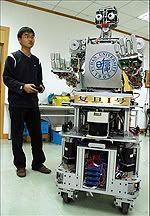Mixed messages
I had an interesting conversation with a construction site manager yesterday. At least it went better than some of the previous interactions I’ve had with them.
It was a nice, warm, sunny day, and I was wandering along Zhongxiao West Road after a pleasant lunch near Camera Street and then hanging around the North Gate watching a wedding photographer chase the retreating light around the square. “Pretend like you’re running!” he called to the prospective groom, while his bride fiddled with makeup in a tiny tent.
“Like this?” the groom lifted a leg up hesitantly. Clearly he hadn’t been expecting this, especially after putting on a fancy white-and-purple suit.
“No, you look like a dog peeing!” the photographer said, but in a nice way. “Run like a bus is about to hit you!” This was helpful advice, as buses were indeed zooming by inches behind him.
I walked east and got yelled at by a crazy Chinese monk for taking a photo of the Mitsukoshi Building. “Don’t fuck with me! I am long exiled from Foshan!” he shouted.
I kept walking, ending up on the famous pedestrian bridge at the intersection of Zhongxiao and Zhongshan. A busy construction site where the old round City Council building used to be caught my eye, and I took a few shots from the bridge before heading down to see if the light was nicer from street level.
“You can’t take photographs here,” a site manager walked over to tell me.
“Why’s that?”
“Company rules.” I sighed. This again.
“I don’t work for your company. Your site in is public view from the public road I’m standing on, and I’m not violating any safety rules here.” The manager considered this.
“All true, but we could get in trouble if you post these photos and our boss sees them, especially if he sees our company logo.”
“Why would your boss be unhappy at that? It seems like a well-run site. This project has even been shown in the media before.”
“He might yell at us for allowing someone to take photos.”
It was a pleasant, cordial exchange, and while I did not envy this man’s conundrum, I had to tell him: “You might not have noticed, but your site is bathed in reflected light from all these glass buildings next door in the afternoon. That’s going to attract photographers. Also, you’re not only right by a pedestrian bridge that is a famous photography spot, you’re also near hotels, the Executive Yuan and the train station. That means curious tourists walking by. Photography is going to happen. If you make a big deal about hiding the site from them, there’s a chance some of them will be IG influencers, journalists or even members of foreign diplomatic groups.” Someone might even blog about it, I added mentally.
He seemed amenable to this point of view, but he was still in manager mode. “Ok, I’ll let you keep the photos you’ve already taken, including the ones from the pedestrian bridge, but please don’t take any more.”
“There’s nothing you can do about the photos I’ve already taken,” I reminded him, noting that they’d tracked me all the way from the bridge. “But I appreciate your point of view and thanks for being courteous about it.”
As I walked on, I couldn’t help but wonder why people automatically go to some imagined worst-case scenario when they see they are being photographed. Is everyone afraid that their nefarious behavior will get them in trouble? But that can’t be the case, as being recorded by the government and corporations 24/7 has become a matter of course; nobody ever even thinks about it. Then again, government and corporate surveillance is expressly put in place to catch wrongdoing, so is it that far a stretch to imagine that, as such recording becomes more ubiquitous and ever present, the general population just assumes that any kind of photography is accusatory and predatory in nature? People crave attention, but just the safe kind of attention, I suppose. Whatever that is.
To wit: I recently got back in touch with a street photographer I used to chat with back in the early days of Flickr, Joe Wigfall. He no longer even takes photos; he says it had become too much of a hassle, so he paints and writes instead. It’s a shame; he made some very good work when he was active. He noted that when he was out shooting, Black people would give him more shit for photographing them than people from other groups would, and he noticed the same for white and Asian photographers he’d go shooting with. We can give them a pass, but you’re one of us; you should know better seems to be the message they were sending.
I took the subway over to Taipei 101 and walked across Wuxing Street towards the mountains, noticing the imprints of old military villages amid the empty fields as well as the occasional illegal villas with partially demolished balconies. Brightly colored election trucks, cars, motorcycles and bicycles crisscrossed the streets with their various candidates promising various things from mounted loudspeakers. But the sun was setting, so I walked back over to the Tonghua Night Market to meet up with Chenbl for a delicious meal of noodles at a wood-paneled restaurant where the competent young staff played old and pseudo-old jazz. They knew about the Ramblers, and put on some of our music.















